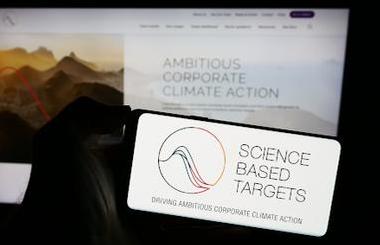Many charities are working hard to set responsible investment objectives, mindful of how these decisions can help push forward their climate-related intentions. What some charities find unclear is how to compare their underlying holdings on a like-for-like basis and ultimately how to measure the effects of these choices on their investment portfolio.
This is why SBTs could be the most important acronym in responsible investing.
What are SBTs?
Science Based Targets (SBTs) are a simple, accessible way of measuring the commitment of individual companies to the Paris Agreement. The Science Based Target initiative (SBTi) is an entity that assesses and approves a company’s emissions reduction targets. Specific guidance must be followed to achieve its external verification, thus giving legitimacy to the target.
What makes SBTs so important?
A key reason why SBTs are favoured is that they always contain an interim target, not just a distant “net-zeroby-2050” proclamation. This is typically committing to a halving of emissions within a decade of the base year, resulting in a decline of about 6% per year (Covid years not withstanding). This matters because, due to the scale of historic cumulative emissions, we have a limited budget left to avoid the worst climate effects; acting in the near-term matters most.
As of the 1 March 2024, the number of companies seeking or receiving validation is over 7,500, a number that is updated weekly on the SBTi website. The extraordinary demand for corporate decarbonization standards and target validation services has prompted a major scale-up in operations.
The SBTi is now a UK charity (no. 1205768), with the stated aim of enabling “companies and financial institutions worldwide to play their part in combating the climate crisis”. The charity will benefit from two $18m donations, one from the IKEA Foundation and the other from the Bezos Earth Fund, that will help improve guidance on specific standards in six high-impact areas, including apparel, automotives, and oil and gas.
The initiative has already created sector specific guidance for some of the most carbon intensive segments of the global economy. This matters because there are seismic differences in carbon intensity between sectors: a cement or utility company may generate Scope 1 and 2 carbon emissions that are 1,000 or 2,000 times that of an insurance company using the equivalent measure (tonnes per $1m of revenue).
How can charities use and benefit from SBTs?
Charities have the option to set their own operational emissions target, though if it is a largely grant-based organisation, these may be minimal. A net-zero target covering Scope 3 emissions could include a charity’s investment portfolio, and this could be where emissions for a charity are highest. Charities can set a target for the proportion of their portfolio invested in companies with SBTs, which they can use to measure their portfolio’s alignment with the Paris Agreement.
A YouGov survey of corporate executives in early adopter SBTi committed businesses was conducted in 2018 to assess the impacts on companies with targets. A series of benefits were highlighted by the respondents (see table above).
All investment managers should be able to provide you with the proportion of your portfolio in equities, corporate bonds and collectives with SBTi targets. The measure transcends customised reporting by each manager, though it is not possible to produce for sovereign bonds.
It is also open-source data, so trustees can look up any company they own and view their commitments using the “Meet the Companies” function on the SBTi website or typing in a company name and SBTi into any search engine.
How could my charity initially approach using SBTs?
Perhaps trustees could start by asking:
- What proportion of our portfolio is currently in companies with SBTs?
- Do our investment managers’ investment processes consider SBTs?
- Could we consider setting SBTi aligned targets across our investment portfolio?
- Do our investment managers engage with companies on our behalf to increase ambition in target setting?
If your charity is reviewing your investment policy and would like to discuss this further, please contact Evelyn Partners at [email protected].
An interview with Katrina Brown, director of responsible investment and Caroline Jarvis Gee head of charity business development at Evelyn Partners.
Fast facts
- £3.3bn in charity investments managed for over 1,244 organisations
- 33 charity specialists operating from eight offices
Brand reputation
- 79% found SBTs strengthened brand reputation
Resilience against regulation
- 35% reported that setting SBTs offered them increased resilience against upcoming regulations
Increased innovation
- 63% agreed that setting SBTs is already driving innovation internally. More than 50% expect half of their products/services to be low-carbon by 2030
Bottom-line savings
- 29% of respondents said that their company had already enjoyed bottom-line savings
Competitive edge
- 55% said committing to the SBTI gave them a competitive advantage
Investor confidence
- 52% believed their SBT commitment had boosted investor confidence in their business
What we do
Evelyn Partners is the UK’s leading integrated wealth management firm. The Evelyn Partners Group of companies works with private clients and charities across a variety of business areas including financial planning, tax, audit, accounting, strategy, business rates, fraud prevention, cyber security and investment management. With investing, your capital is at risk.
Evelyn Partners Investment Management LLP is authorised and regulated by the Financial Conduct Authority. Services may be provided by other firms in the Evelyn Partners group. The Financial Conduct Authority does not regulate all the products and services referred to in this document such as tax, accounting and business services. More information on our services can be found at www.evelyn.com.













